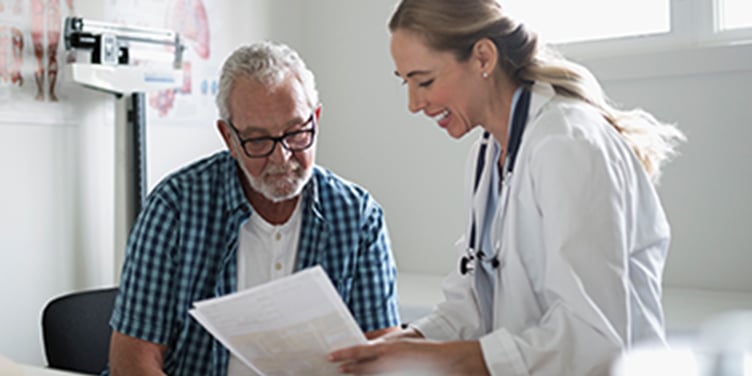Irritable Bowel Syndrome

Overview
Irritable bowel syndrome (IBS) is a common gastrointestinal disorder that affects the normal functions of the intestines, causing recurrent abdominal pain and discomfort, changes in bowel function, diarrhea and constipation. People with IBS have colons that are more sensitive and react to things that might not bother other people, such as stress, large meals, gas, medicines, certain foods, caffeine and alcohol.
IBS occurs in an estimated one in five Americans, and is more prevalent among women. It usually develops in late adolescence or early adulthood around age 20 and rarely appears for the first time after the age of 50.
Our Approach to Irritable Bowel Syndrome
UCSF delivers state-of-the-art, comprehensive care for all gastrointestinal conditions, including irritable bowel syndrome (IBS). Although there is no cure for IBS at this time, treatments can help patients feel better. These include lifestyle changes to reduce stress and negative emotions, both of which can trigger IBS, as well as dietary changes and medications. Our goal is to reduce and – if possible – eliminate our patients' symptoms.
Awards & recognition
-

Among the top hospitals in the nation
-

One of the nation's best in gastroenterology & GI surgery
Signs & symptoms
Common symptoms of irritable bowel syndrome (IBS) include:
- Abdominal pain
- Bloating
- Constipation
- Diarrhea
- Abnormal stool frequency, form and passage
Some patients with IBS experience alternating diarrhea and constipation. Mucus also may be present around or within the stool.
Diagnosis
Irritable bowel syndrome (IBS) shares many of the same symptoms with other gastrointestinal disorders. If you think you have IBS, you should visit your doctor.
There is no particular diagnostic test for IBS. The condition is diagnosed based on its symptoms and by ruling out other diseases. Typically your doctor will begin by asking about your medical history and your current symptoms. In addition, he or she will perform a physical evaluation. Diagnostic tests may be used to rule out other disorders. These can include stool or blood tests, X-rays, endoscopy and colonoscopy.
Because IBS has symptoms similar to other gastrointestinal disorders, doctors use specific criteria to help make a definite diagnosis. These include the following:
- Abdominal pain or discomfort experienced for at least 12 weeks out of the previous 12 months. These 12 weeks do not have to be consecutive.
The abdominal pain or discomfort has two of the following three features:
- The pain or discomfort is relieved by having a bowel movement.
- When it starts, there is a change in how often you have a bowel movement.
- When it starts, there is a change in the form of the stool or the way it looks.
Treatments
Although there is no cure for irritable bowel syndrome (IBS), there are many options available for treating and eliminating its symptoms.
Because stress and feeling mentally or emotionally tense, troubled, angry or overwhelmed can stimulate intestinal spasms in people with IBS, your doctor may suggest relaxation techniques, such as yoga, exercise and meditation. Tranquilizers and anti-depressants also may relieve symptoms. In addition, a healthy diet that includes lots of water, fiber and small meals may reduce flare-ups.
Fiber supplements or occasional laxatives may help with constipation, while medicines to decrease diarrhea and control intestinal muscle spasms may help reduce abdominal pain.
Medications available to treat IBS specifically include the following:
- Alosetron hydrochloride (Lotronex) can be used for women with severe IBS who have not responded to conventional therapy and whose primary symptom is diarrhea. However, even in these patients, it should be used with caution because it can have serious side effects, such as severe constipation or decreased blood flow to the colon.
- Tegaserod maleate (Zelnorm) is typically given on a short-term basis to women with IBS whose primary symptom is constipation.
UCSF Health medical specialists have reviewed this information. It is for educational purposes only and is not intended to replace the advice of your doctor or other health care provider. We encourage you to discuss any questions or concerns you may have with your provider.









